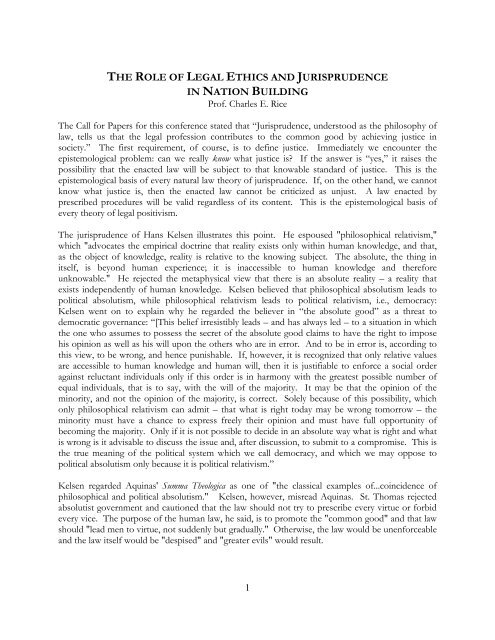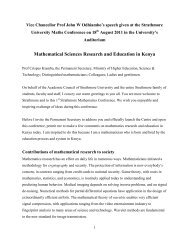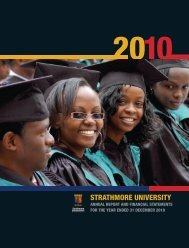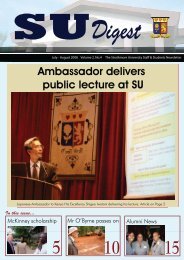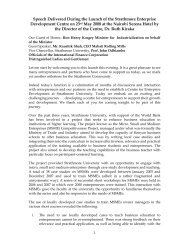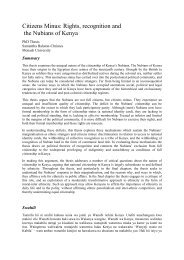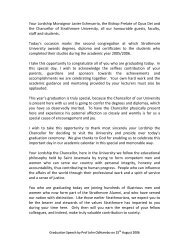the role of legal ethics and jurisprudence in nation building
the role of legal ethics and jurisprudence in nation building
the role of legal ethics and jurisprudence in nation building
Create successful ePaper yourself
Turn your PDF publications into a flip-book with our unique Google optimized e-Paper software.
THE ROLE OF LEGAL ETHICS AND JURISPRUDENCEIN NATION BUILDINGPr<strong>of</strong>. Charles E. RiceThe Call for Papers for this conference stated that “Jurisprudence, understood as <strong>the</strong> philosophy <strong>of</strong>law, tells us that <strong>the</strong> <strong>legal</strong> pr<strong>of</strong>ession contributes to <strong>the</strong> common good by achiev<strong>in</strong>g justice <strong>in</strong>society.” The first requirement, <strong>of</strong> course, is to def<strong>in</strong>e justice. Immediately we encounter <strong>the</strong>epistemological problem: can we really know what justice is? If <strong>the</strong> answer is “yes,” it raises <strong>the</strong>possibility that <strong>the</strong> enacted law will be subject to that knowable st<strong>and</strong>ard <strong>of</strong> justice. This is <strong>the</strong>epistemological basis <strong>of</strong> every natural law <strong>the</strong>ory <strong>of</strong> <strong>jurisprudence</strong>. If, on <strong>the</strong> o<strong>the</strong>r h<strong>and</strong>, we cannotknow what justice is, <strong>the</strong>n <strong>the</strong> enacted law cannot be criticized as unjust. A law enacted byprescribed procedures will be valid regardless <strong>of</strong> its content. This is <strong>the</strong> epistemological basis <strong>of</strong>every <strong>the</strong>ory <strong>of</strong> <strong>legal</strong> positivism.The <strong>jurisprudence</strong> <strong>of</strong> Hans Kelsen illustrates this po<strong>in</strong>t. He espoused "philosophical relativism,"which "advocates <strong>the</strong> empirical doctr<strong>in</strong>e that reality exists only with<strong>in</strong> human knowledge, <strong>and</strong> that,as <strong>the</strong> object <strong>of</strong> knowledge, reality is relative to <strong>the</strong> know<strong>in</strong>g subject. The absolute, <strong>the</strong> th<strong>in</strong>g <strong>in</strong>itself, is beyond human experience; it is <strong>in</strong>accessible to human knowledge <strong>and</strong> <strong>the</strong>reforeunknowable." He rejected <strong>the</strong> metaphysical view that <strong>the</strong>re is an absolute reality – a reality thatexists <strong>in</strong>dependently <strong>of</strong> human knowledge. Kelsen believed that philosophical absolutism leads topolitical absolutism, while philosophical relativism leads to political relativism, i.e., democracy:Kelsen went on to expla<strong>in</strong> why he regarded <strong>the</strong> believer <strong>in</strong> “<strong>the</strong> absolute good” as a threat todemocratic governance: “[This belief irresistibly leads – <strong>and</strong> has always led – to a situation <strong>in</strong> which<strong>the</strong> one who assumes to possess <strong>the</strong> secret <strong>of</strong> <strong>the</strong> absolute good claims to have <strong>the</strong> right to imposehis op<strong>in</strong>ion as well as his will upon <strong>the</strong> o<strong>the</strong>rs who are <strong>in</strong> error. And to be <strong>in</strong> error is, accord<strong>in</strong>g tothis view, to be wrong, <strong>and</strong> hence punishable. If, however, it is recognized that only relative valuesare accessible to human knowledge <strong>and</strong> human will, <strong>the</strong>n it is justifiable to enforce a social orderaga<strong>in</strong>st reluctant <strong>in</strong>dividuals only if this order is <strong>in</strong> harmony with <strong>the</strong> greatest possible number <strong>of</strong>equal <strong>in</strong>dividuals, that is to say, with <strong>the</strong> will <strong>of</strong> <strong>the</strong> majority. It may be that <strong>the</strong> op<strong>in</strong>ion <strong>of</strong> <strong>the</strong>m<strong>in</strong>ority, <strong>and</strong> not <strong>the</strong> op<strong>in</strong>ion <strong>of</strong> <strong>the</strong> majority, is correct. Solely because <strong>of</strong> this possibility, whichonly philosophical relativism can admit – that what is right today may be wrong tomorrow – <strong>the</strong>m<strong>in</strong>ority must have a chance to express freely <strong>the</strong>ir op<strong>in</strong>ion <strong>and</strong> must have full opportunity <strong>of</strong>becom<strong>in</strong>g <strong>the</strong> majority. Only if it is not possible to decide <strong>in</strong> an absolute way what is right <strong>and</strong> whatis wrong is it advisable to discuss <strong>the</strong> issue <strong>and</strong>, after discussion, to submit to a compromise. This is<strong>the</strong> true mean<strong>in</strong>g <strong>of</strong> <strong>the</strong> political system which we call democracy, <strong>and</strong> which we may oppose topolitical absolutism only because it is political relativism.”Kelsen regarded Aqu<strong>in</strong>as' Summa Theologica as one <strong>of</strong> "<strong>the</strong> classical examples <strong>of</strong>...co<strong>in</strong>cidence <strong>of</strong>philosophical <strong>and</strong> political absolutism." Kelsen, however, misread Aqu<strong>in</strong>as. St. Thomas rejectedabsolutist government <strong>and</strong> cautioned that <strong>the</strong> law should not try to prescribe every virtue or forbidevery vice. The purpose <strong>of</strong> <strong>the</strong> human law, he said, is to promote <strong>the</strong> "common good" <strong>and</strong> that lawshould "lead men to virtue, not suddenly but gradually." O<strong>the</strong>rwise, <strong>the</strong> law would be unenforceable<strong>and</strong> <strong>the</strong> law itself would be "despised" <strong>and</strong> "greater evils" would result.1
Law, accord<strong>in</strong>g to Kelsen, is a system <strong>of</strong> coercive rules called “<strong>legal</strong> norms.” Those rules areprescribed by <strong>the</strong> legislator <strong>in</strong> accord with <strong>the</strong> “basic norm” or constitution <strong>of</strong> <strong>the</strong> community. Thatbasic norm may or may not be <strong>in</strong> a written constitution. The legislator may be a court, an executiveor adm<strong>in</strong>istrator, or a legislature. The legislator decides what <strong>the</strong> basic norm is <strong>and</strong> whe<strong>the</strong>r anyparticular law is <strong>in</strong> accord with it. Nor is <strong>the</strong>re any restriction on <strong>the</strong> content <strong>of</strong> <strong>legal</strong> rules. “Anycontent whatsoever can be <strong>legal</strong>; <strong>the</strong>re is no human behavior which could not function as <strong>the</strong>content <strong>of</strong> a <strong>legal</strong> norm.” The only requirement for a law to be valid <strong>and</strong> b<strong>in</strong>d<strong>in</strong>g is that “it has beenconstituted <strong>in</strong> a particular fashion, born <strong>of</strong> a def<strong>in</strong>ite procedure <strong>and</strong> a def<strong>in</strong>ite rule.” The legislatordecides what law will be useful <strong>and</strong> <strong>in</strong> accord with <strong>the</strong> basic norm as determ<strong>in</strong>ed by himself. Once alaw is enacted <strong>and</strong> <strong>in</strong> force, it is obligatory. There is no knowable higher law <strong>of</strong> nature or <strong>of</strong> God,<strong>and</strong> <strong>the</strong> ultimate criterion is <strong>the</strong> enforced will <strong>of</strong> <strong>the</strong> legislator. The positive law cannot be criticizedas unjust. Kelsen’s "philosophical relativism" can <strong>of</strong>fer no basis for object<strong>in</strong>g, on grounds <strong>of</strong> justice,to decisions made through <strong>the</strong> political process. Kelsen acknowledged that <strong>the</strong> laws <strong>of</strong> <strong>the</strong> Nazi <strong>and</strong>o<strong>the</strong>r totalitarian regimes, regardless <strong>of</strong> <strong>the</strong>ir content, were valid because <strong>the</strong>y were duly enacted:"The <strong>legal</strong> order <strong>of</strong> totalitarian states authorizes <strong>the</strong>ir governments to conf<strong>in</strong>e <strong>in</strong> concentrationcamps persons whose op<strong>in</strong>ions, religion, or race <strong>the</strong>y do not like; to force <strong>the</strong>m to perform any k<strong>in</strong>d<strong>of</strong> labor, even to kill <strong>the</strong>m. Such measures may be morally or violently condemned; but <strong>the</strong>y cannotbe considered as tak<strong>in</strong>g place outside <strong>the</strong> <strong>legal</strong> order <strong>of</strong> those states." 1 Thus, "from <strong>the</strong> po<strong>in</strong>t <strong>of</strong> view<strong>of</strong> <strong>the</strong> science <strong>of</strong> law, <strong>the</strong> law under <strong>the</strong> Nazi-government was law. We may regret it but we cannotdeny that it was law." 2 (50 Q. 93-94)Kelsen’s “pure <strong>the</strong>ory <strong>of</strong> law” is <strong>in</strong>structive because it is <strong>the</strong> most clear-cut form <strong>of</strong> <strong>legal</strong> positivism.All positivist systems, however, are characterized, <strong>in</strong> greater or lesser degree, by <strong>the</strong> denial <strong>of</strong> <strong>the</strong>capacity <strong>of</strong> human reason to know what is right <strong>and</strong> wrong. They are concerned only with what <strong>the</strong>law is, not with what it ought to be. For Oliver Wendell Holmes, <strong>the</strong> lead<strong>in</strong>g figure <strong>in</strong> AmericanLegal Realism, “law” is not an ord<strong>in</strong>ance <strong>of</strong> reason, but merely “a statement <strong>of</strong> <strong>the</strong> circumstances <strong>in</strong>which <strong>the</strong> public force will be brought to bear upon men through <strong>the</strong> courts: that is <strong>the</strong> prophecy <strong>in</strong>general terms. Of course <strong>the</strong> prophecy becomes more specific to def<strong>in</strong>e a right.” 3 For Holmes,“<strong>the</strong> sacredness <strong>of</strong> human life is a purely municipal ideal <strong>of</strong> no validity outside <strong>the</strong> jurisdiction. Ibelieve that force, mitigated so far as may be by good manners, is <strong>the</strong> ultima ratio, <strong>and</strong> between twogroups that want to make <strong>in</strong>consistent k<strong>in</strong>ds <strong>of</strong> world I see no remedy except force..” 4 Holmes,perhaps <strong>the</strong> lead<strong>in</strong>g figure <strong>of</strong> American <strong>jurisprudence</strong>, def<strong>in</strong>ed truth as “<strong>the</strong> majority vote <strong>of</strong> <strong>the</strong><strong>nation</strong> that could lick all o<strong>the</strong>rs.” 5 “I see no reason for attribut<strong>in</strong>g to man,” he wrote, “asignificance different <strong>in</strong> k<strong>in</strong>d from that which belongs to a baboon or a gra<strong>in</strong> <strong>of</strong> s<strong>and</strong>.” 61Hans Kelsen, Pure Theory <strong>of</strong> Law (1967), 40; see R.S. Clark, "Hans Kelsen's Pure Theory <strong>of</strong> Law," 22 J. <strong>of</strong>Leg. Ed. 170, 182 (1969).2 Hans Kelsen, Das Naturrecht <strong>in</strong> der politischen Theorie (F.M. Schmoetz, ed., 1963), 148, quoted <strong>in</strong>translation <strong>in</strong> F.A. Hayek, Law, Legislation <strong>and</strong> Liberty (Vol. 2, The Mirage <strong>of</strong> Social Justice) (1976), 56.32 Holmes-Pollock Letters (1941), 212.42 Holmes-Pollock Letters (1942), 36; See Oliver Wendell Holmes, “The Natural Law,” 32 Harv. L. Rev. 40,(1918).5Oliver Wendell Holmes, The Natural Law: Collected Legal Papers (1920), 310.62 Holmes-Pollock Letters (1942), 252; see discussion <strong>in</strong> William Kenealy, S.J., “The Majesty <strong>of</strong> <strong>the</strong> Law,” 5Loyola Law Rev. 101, 107-08; Charles E. Rice, Beyond Abortion: The Theory <strong>and</strong> Practice <strong>of</strong> <strong>the</strong> Secular State (1979),chs. 2 <strong>and</strong> 6.2
In 1942, Francis E. Lucey, S.J., described <strong>the</strong> contrast between <strong>the</strong> natural law <strong>and</strong> <strong>the</strong> postivistLegal Realism espoused by Holmes <strong>and</strong> his successors under various labels:Non-natural law systems <strong>of</strong> Jurisprudence rest on a view <strong>of</strong> man’s nature thatmakes man <strong>in</strong>dependent <strong>of</strong> his creator <strong>and</strong> hence <strong>the</strong> helpless prey <strong>of</strong> his fellow men.For Holmes <strong>and</strong> <strong>the</strong> Realist he is a sort <strong>of</strong> superior animal. For Scholastic NaturalLaw, man is a be<strong>in</strong>g with a m<strong>in</strong>d <strong>and</strong> a soul, <strong>and</strong> hence, superior to animals. Hederives his dignity not from o<strong>the</strong>r men, but from God his creator. This question <strong>of</strong>God <strong>and</strong> morals <strong>in</strong> law is <strong>the</strong> real basic difference between Natural Law <strong>and</strong> o<strong>the</strong>rphilosophies <strong>of</strong> law. If <strong>the</strong>re is no God, man is only an animal. He has no <strong>in</strong>natedignity <strong>and</strong> no de jure <strong>in</strong>dependence. He is bound by no norm. Morals have no place<strong>in</strong> law. Man is subject to <strong>the</strong> law for animals, physical force. This much must be saidfor Realism. If man is only an animal, Realism is correct, Holmes was correct, Hitleris correct. 7Whe<strong>the</strong>r utilitarian, social contract, realist or any o<strong>the</strong>r, all systems <strong>of</strong> <strong>legal</strong> positivism restupon an epistemological agnosticism that precludes <strong>the</strong> measurement <strong>of</strong> enacted law by any st<strong>and</strong>ard<strong>of</strong> objective justice. Thus Jeremy Bentham described assertions <strong>of</strong> “an eternal <strong>and</strong> immutable Rule<strong>of</strong> Right” as “sentiments.” 8 John Stuart Mill concluded that “<strong>the</strong> non-existence <strong>of</strong> an acknowledgedfirst pr<strong>in</strong>ciple has made <strong>ethics</strong> not so much a guide as a consecration <strong>of</strong> men’s actual sentiments.” 9John Locke, who regarded <strong>the</strong> purpose <strong>of</strong> <strong>the</strong> state, formed by <strong>the</strong> social contract, as <strong>the</strong> protection<strong>of</strong> rights, subjected <strong>the</strong> content <strong>of</strong> law, <strong>in</strong>clud<strong>in</strong>g <strong>the</strong> def<strong>in</strong>ition <strong>of</strong> rights, to majority rule: “And thusevery man, by consent<strong>in</strong>g with o<strong>the</strong>rs to make one body politic under one government, puts himselfunder an obligation to every one <strong>of</strong> that society to submit to <strong>the</strong> determ<strong>in</strong>ation <strong>of</strong> <strong>the</strong> majority, <strong>and</strong>to be concluded by it.” 10To serve a coherent <strong>role</strong> <strong>in</strong> “<strong>nation</strong> build<strong>in</strong>g,” a system <strong>of</strong> <strong>jurisprudence</strong> ought to provide anobjective guide for determ<strong>in</strong><strong>in</strong>g <strong>the</strong> content <strong>of</strong> general terms <strong>in</strong> <strong>the</strong> constitution <strong>and</strong> laws. And itought to provide a reasoned basis <strong>in</strong> objective justice for critical evaluation <strong>of</strong> enactments enforc<strong>in</strong>gthose general terms. The Constitution <strong>of</strong> Kenya conta<strong>in</strong>s numerous provisions which raise <strong>the</strong>seissues. 11 7Francis E. Lucey, S.J., “Natural Law <strong>and</strong> American Legal Realism: Their Respective Contributions to a Theory<strong>of</strong> Law <strong>in</strong> a Democratic Society,” 30 Georgetown L. J. 493, 531 (1942). See also, Charles E. Rice, Beyond Abortion:The Theory <strong>and</strong> Practice <strong>of</strong> <strong>the</strong> Secular State (1979), 7-15.8Jeremy Bentham, An Introduction to <strong>the</strong> Pr<strong>in</strong>ciples <strong>of</strong> Morals <strong>and</strong> Legislation, (Oxford, Clarendon Press,1907), Chap. II, no. 14, p.17.9John Stuart Mill, Utilitarianism, Government, (London, J.M. Dent & Sons, Ltd.), Chap. I, p.3.10John Locke, Two Treatises <strong>of</strong> Civil Government (London, J.M. Dent & Sons, Ltd.), Book II, Chap. VIII,p.165.11 The Constitution <strong>of</strong> Kenya guarantees to “every person <strong>in</strong> Kenya <strong>the</strong> fundamental rights <strong>and</strong> freedoms <strong>of</strong> <strong>the</strong><strong>in</strong>dividual, that is to say, <strong>the</strong> right, whatever his race, tribe, place <strong>of</strong> orig<strong>in</strong> or residence or o<strong>the</strong>r local connexion,political op<strong>in</strong>ions, colour, creed or sex, but subject to respect for <strong>the</strong> rights <strong>and</strong> freedoms <strong>of</strong> o<strong>the</strong>rs <strong>and</strong> for <strong>the</strong> public<strong>in</strong>terest, to each <strong>and</strong> all <strong>of</strong> <strong>the</strong> follow<strong>in</strong>g, namely–(a) life, liberty, security <strong>of</strong> <strong>the</strong> person <strong>and</strong> <strong>the</strong> protection <strong>of</strong> <strong>the</strong> law;(b) freedom <strong>of</strong> conscience, <strong>of</strong> expression <strong>and</strong> <strong>of</strong> assembly <strong>and</strong> association; <strong>and</strong>(c) protection for <strong>the</strong> privacy <strong>of</strong> his home <strong>and</strong> o<strong>the</strong>r property <strong>and</strong> from deprivation <strong>of</strong> property withoutcompensation. Sec. 70.3
No constitutional guarantees <strong>of</strong> rights <strong>and</strong> freedoms can be foolpro<strong>of</strong> aga<strong>in</strong>stmis<strong>in</strong>terpretation or abuse. But a <strong>jurisprudence</strong> <strong>of</strong> epistemological agnosticism can <strong>of</strong>fer nopr<strong>in</strong>cipled basis for sett<strong>in</strong>g moral boundaries to <strong>the</strong> <strong>in</strong>terpretation <strong>of</strong> constitutional texts.The <strong>in</strong>terpretation <strong>of</strong> constitutional guarantees will promote <strong>the</strong> common good <strong>and</strong>safeguard liberty only if <strong>the</strong> <strong>in</strong>terpreters recognize <strong>in</strong> <strong>the</strong>ir work an <strong>in</strong>tellectually knowable, objectivecontent to <strong>the</strong> terms <strong>in</strong> which constitutional guarantees are phased. The identification <strong>of</strong> suchobjective content is not a sectarian religious enterprise. It ra<strong>the</strong>r <strong>in</strong>volves an explication <strong>of</strong>pr<strong>in</strong>ciples rooted <strong>in</strong> natural law as well as culture.The natural law performs a “constructive” <strong>and</strong> a “protective” function with respect tohuman law. In its constructive <strong>role</strong>, natural law provides a guide for <strong>the</strong> enactment <strong>of</strong> laws topromote <strong>the</strong> common good. While <strong>the</strong> human law, as Aqu<strong>in</strong>as emphasized, should not attempt toprohibit every vice or enforce every virtue, 12 <strong>the</strong> natural law can serve as a guide to <strong>the</strong> way th<strong>in</strong>gsought to work accord<strong>in</strong>g to reason <strong>and</strong> nature. Natural law pr<strong>in</strong>ciples <strong>of</strong> morality <strong>and</strong> social justiceought to <strong>in</strong>form <strong>the</strong> public discussion <strong>of</strong> issues such as <strong>the</strong> family, <strong>the</strong> economy, <strong>the</strong> prevention <strong>of</strong>racial discrim<strong>in</strong>ation, etc. This is not to claim that natural law "pretends to be some sort <strong>of</strong> magicformula that furnishes h<strong>and</strong>y answers for whatever practical <strong>legal</strong> questions may arise." 13 In itsconstructive <strong>role</strong>, it <strong>of</strong>fers not a cookbook <strong>of</strong> <strong>legal</strong> <strong>and</strong> social recipes, but a guide to generalreasonable pr<strong>in</strong>ciples <strong>and</strong> objectives.In its second, or protective <strong>role</strong>, <strong>the</strong> natural law provides a basis for criticism <strong>of</strong> <strong>the</strong> enactedlaw as unjust. In this <strong>role</strong> it can be protective <strong>of</strong> <strong>the</strong> rights <strong>of</strong> <strong>the</strong> people. It provides a basis for usto draw <strong>the</strong> l<strong>in</strong>e <strong>and</strong> to criticize an act <strong>of</strong> <strong>the</strong> state as unjust <strong>and</strong> void. Without <strong>the</strong> natural law, <strong>the</strong>people have no basis o<strong>the</strong>r than <strong>the</strong> pragmatic <strong>and</strong> utilitarian on which to respond to unjust laws.The ability, provided only by natural law, to challenge <strong>the</strong> very validity <strong>of</strong> an unjust law is animportant safeguard aga<strong>in</strong>st <strong>the</strong> enactment <strong>and</strong> enforcement <strong>of</strong> such laws. This protective functionis also constructive <strong>in</strong> that <strong>the</strong> recognition that <strong>the</strong>re is a protective l<strong>in</strong>e beyond which <strong>the</strong> state maynot go may serve to encourage <strong>the</strong> enactment <strong>of</strong> laws that are truly just. 14The Constitution also provides that: “No person shall be subject to torture or to <strong>in</strong>human or degrad<strong>in</strong>gpunishment or o<strong>the</strong>r treatment.” Sec. 74(1).“Except with his own consent, no person shall be h<strong>in</strong>dered <strong>in</strong> <strong>the</strong> enjoyment <strong>of</strong> his freedom <strong>of</strong> conscience, <strong>and</strong>for <strong>the</strong> purposes <strong>of</strong> this section that freedom <strong>in</strong>cludes freedom <strong>of</strong> thought <strong>and</strong> <strong>of</strong> religion, freedom to change hisreligion or belief, <strong>and</strong> freedom, ei<strong>the</strong>r alone or <strong>in</strong> community with o<strong>the</strong>rs, <strong>and</strong> both <strong>in</strong> public <strong>and</strong> <strong>in</strong> private, tomanifest <strong>and</strong> propagate his religion or belief <strong>in</strong> worship, teach<strong>in</strong>g, practice <strong>and</strong> observance.” Sec. 78(1).“(1) Except with his own consent, no person shall be h<strong>in</strong>dered <strong>in</strong> <strong>the</strong> enjoyment <strong>of</strong> his freedom <strong>of</strong> expression,that is to say, freedom to hold op<strong>in</strong>ions without <strong>in</strong>terference, freedom to receive ideas <strong>and</strong> <strong>in</strong>formation without<strong>in</strong>terference, freedom to communicate ideas <strong>and</strong> <strong>in</strong>formation without <strong>in</strong>terference (whe<strong>the</strong>r <strong>the</strong> communication be to<strong>the</strong> public generally or to any person or class <strong>of</strong> personal <strong>and</strong> freedom from <strong>in</strong>terference with his correspondence.“(2) Noth<strong>in</strong>g conta<strong>in</strong>ed <strong>in</strong> or done under <strong>the</strong> authority <strong>of</strong> any law shall be held to be <strong>in</strong>consistent with or <strong>in</strong>contravention <strong>of</strong> this section to <strong>the</strong> extent that <strong>the</strong> law <strong>in</strong> question makes provision–(a) that is reasonably required <strong>in</strong> <strong>the</strong> <strong>in</strong>terests <strong>of</strong> defence, public safety, public order, public morality or public health.Sec. 79 (1)(2).12 See Questions 13 <strong>and</strong> 14, below.13 Thomas E. Davitt, S.J., "St. Thomas Aqu<strong>in</strong>as <strong>and</strong> <strong>the</strong> Natural Law," <strong>in</strong> Orig<strong>in</strong>s <strong>of</strong> <strong>the</strong> Natural Law Tradition(1954), 45.14 See discussion <strong>in</strong> Charles E. Rice, "Some Reasons for a Restoration <strong>of</strong> Natural Law Jurisprudence," 24 Wake ForestL. Rev. 539, 566-67 (1989).4
Inevitably, however, an affirmation <strong>of</strong> natural law must identify its author. Anytime anyonetells you that some proposed action is “aga<strong>in</strong>st <strong>the</strong> law,” <strong>the</strong> <strong>in</strong>st<strong>in</strong>ctive response should be – <strong>and</strong> is– to ask, “Whose law?” The natural law can be explored coherently only if we can identify <strong>the</strong>Lawgiver <strong>of</strong> that natural law. The Author <strong>of</strong> <strong>the</strong> natural law has to be <strong>the</strong> Author <strong>of</strong> nature, i.e.,God. Thus, <strong>the</strong> Declaration <strong>of</strong> Independence <strong>of</strong> <strong>the</strong> United States affirmed its reliance on “<strong>the</strong>Laws <strong>of</strong> Nature <strong>and</strong> <strong>of</strong> Nature’s God.” The Declaration stated “that all men are created equal, that<strong>the</strong>y are endowed by <strong>the</strong>ir Creator with certa<strong>in</strong> unalienable rights.” If <strong>the</strong>re is no God <strong>and</strong><strong>the</strong>refore no ultimate Lawgiver higher than <strong>the</strong> state, what basis can <strong>the</strong>re be for affirm<strong>in</strong>g atranscendent dignity <strong>of</strong> <strong>the</strong> human person over aga<strong>in</strong>st <strong>the</strong> State? And what limits, o<strong>the</strong>r than <strong>the</strong>political, can <strong>the</strong>re be to what <strong>the</strong> state can do to manipulate <strong>and</strong> o<strong>the</strong>rwise oppress human be<strong>in</strong>gs?As you read <strong>the</strong>se l<strong>in</strong>es, a child is be<strong>in</strong>g born <strong>in</strong> Nairobi or elsewhere <strong>in</strong> Kenya. That child’slife began about n<strong>in</strong>e months previously. That child’s soul, his life pr<strong>in</strong>ciple, is spiritual. We knowthis because <strong>the</strong> human person has <strong>the</strong> natural faculty to perform <strong>the</strong> activities <strong>of</strong> abstraction <strong>and</strong>reflection, which are activities that only a spiritual entity can perform. That child’s soul, <strong>of</strong> itsnature, is immortal because, as a spiritual entity, it has no parts. S<strong>in</strong>ce <strong>the</strong> death <strong>of</strong> an entity is itsbreak<strong>in</strong>g <strong>in</strong>to its component parts, <strong>the</strong> nature <strong>of</strong> <strong>the</strong> spiritual soul is to live forever <strong>and</strong> not to die.We know from Revelation that <strong>the</strong> immortal human person was created by God to share eternally <strong>in</strong><strong>the</strong> perfect happ<strong>in</strong>ess <strong>of</strong> <strong>the</strong> life <strong>of</strong> <strong>the</strong> Tr<strong>in</strong>ity. 15 Someday <strong>the</strong>re will be no Nairobi, no Kenya, noRome, New York, Ch<strong>in</strong>a, etc. It will all be gone. But that child will still be alive. This is <strong>the</strong> onlybasis for a coherent assertion <strong>of</strong> transcendent, <strong>in</strong>violable rights aga<strong>in</strong>st <strong>the</strong> state. Every state that hasever existed, or that ever will exist, has gone out <strong>of</strong> bus<strong>in</strong>ess or will go out <strong>of</strong> bus<strong>in</strong>ess someday. Butevery human be<strong>in</strong>g who has ever existed, or ever will exist, will live forever. That is why <strong>the</strong> stateexists for <strong>the</strong> person <strong>and</strong> not vice versa.For <strong>the</strong> past three centuries <strong>and</strong> more <strong>the</strong> philosophers <strong>and</strong> politicians <strong>of</strong> <strong>the</strong> Enlightenmenthave attempted to build society as if God did not exist. “Religion had to be purged from public lifebecause, with <strong>the</strong> enshr<strong>in</strong>ement <strong>of</strong> ‘reason’ as <strong>the</strong> guide <strong>of</strong> men, <strong>the</strong> experiences which <strong>in</strong>spiredreligious symbolisms were deemed unscientific.” 16 Measured by its own utilitarian criteria, <strong>the</strong>Enlightenment project has not worked. The twentieth century produced more declarations <strong>of</strong>human rights <strong>the</strong>n any previous century. Yet it produced also an unprecedented denial <strong>of</strong> rights on amassive scale, <strong>in</strong>clud<strong>in</strong>g <strong>the</strong> systematic exterm<strong>in</strong>ation <strong>of</strong> target groups. Nor was that century notablefor <strong>the</strong> ma<strong>in</strong>tenance <strong>of</strong> high ethical st<strong>and</strong>ards by <strong>in</strong>dividuals <strong>in</strong> <strong>the</strong> conduct <strong>of</strong> government <strong>and</strong>bus<strong>in</strong>ess, as seen <strong>in</strong> examples from <strong>the</strong> United States as well as o<strong>the</strong>r <strong>nation</strong>s.It is time to reassess <strong>the</strong> epistemological assumptions <strong>of</strong> Enlightenment <strong>jurisprudence</strong>,especially as it relates to “<strong>nation</strong> build<strong>in</strong>g.” An underappreciated resource <strong>in</strong> this reassessment is <strong>the</strong>work <strong>of</strong> <strong>the</strong> Polish Pope, John Paul II. He is, <strong>of</strong> course, a religious leader. But his writ<strong>in</strong>gs,<strong>in</strong>clud<strong>in</strong>g especially Centesimus Annus, Evangelium Vitae, Veritatis Splendor <strong>and</strong> Fides et Ratio, amongo<strong>the</strong>rs, establish him, <strong>in</strong> this writer’s op<strong>in</strong>ion, as <strong>the</strong> foremost contemporary writer <strong>of</strong> <strong>jurisprudence</strong>as that term is def<strong>in</strong>ed <strong>in</strong> <strong>the</strong> Call for Papers <strong>of</strong> this Conference. John Paul’s teach<strong>in</strong>gs arenormative for Catholics but <strong>the</strong>y can be considered with pr<strong>of</strong>it by all persons who seek to <strong>in</strong>tegrate<strong>the</strong> law with reason <strong>and</strong> liberty.This essay does not pretend to <strong>of</strong>fer a systematic analysis <strong>of</strong> positions taken by <strong>the</strong> Pope.Ra<strong>the</strong>r, <strong>the</strong> purpose is to suggest that his analysis <strong>of</strong> pr<strong>in</strong>ciples <strong>and</strong> events ought to be taken15 See discussion <strong>in</strong> Charles E. Rice, “50 Questions on <strong>the</strong> Natural Law” (2d ed., 1999), 125-71.16 William Smith, “The First Amendment <strong>and</strong> Progress,” Humanities (Summer, 1987), 1, 6.5
immutable <strong>and</strong> unconditioned... . (WS 307)“In <strong>the</strong> political sphere,” John Paul said, ”truthfulness...between those govern<strong>in</strong>g <strong>and</strong> thosegoverned, openness <strong>in</strong> public adm<strong>in</strong>istration, impartiality [<strong>and</strong>] <strong>the</strong> rejection <strong>of</strong> equivocal or illicitmeans...all <strong>the</strong>se are pr<strong>in</strong>ciples...rooted <strong>in</strong>...<strong>the</strong> transcendent value <strong>of</strong> <strong>the</strong> person <strong>and</strong> <strong>the</strong> objectivemoral dem<strong>and</strong>s <strong>of</strong> <strong>the</strong> function<strong>in</strong>g <strong>of</strong> States. When <strong>the</strong>se pr<strong>in</strong>ciples are not observed, <strong>the</strong> very basis<strong>of</strong> political coexistence is weakened <strong>and</strong> <strong>the</strong> life <strong>of</strong> society itself is gradually jeopardized...<strong>and</strong>doomed to decay.” 21In Fides et Ratio, John Paul noted <strong>the</strong> “‘tendency to grant to <strong>the</strong> <strong>in</strong>dividual conscience <strong>the</strong>prerogative <strong>of</strong> <strong>in</strong>dependently determ<strong>in</strong><strong>in</strong>g <strong>the</strong> criteria <strong>of</strong> good <strong>and</strong> evil <strong>and</strong> <strong>the</strong>n act<strong>in</strong>g accord<strong>in</strong>gly.Such an outlook is quite congenial to an <strong>in</strong>dividualist ethic, where<strong>in</strong> each <strong>in</strong>dividual is faced with hisown truth different from <strong>the</strong> truth <strong>of</strong> o<strong>the</strong>rs.’” 22 But as John Paul put it, “<strong>the</strong> roots <strong>of</strong> <strong>the</strong>contradiction between <strong>the</strong> solemn affirmation <strong>of</strong> human rights <strong>and</strong> <strong>the</strong>ir tragic denial <strong>in</strong> practice lies<strong>in</strong> a notion <strong>of</strong> freedom which exalts <strong>the</strong> isolated <strong>in</strong>dividual <strong>in</strong> an absolute way, <strong>and</strong> gives no place tosolidarity, to openness to o<strong>the</strong>rs <strong>and</strong> service <strong>of</strong> <strong>the</strong>m. ... . [A] completely <strong>in</strong>dividualistic concept <strong>of</strong>freedom, ... ends up by becom<strong>in</strong>g <strong>the</strong> freedom <strong>of</strong> ‘<strong>the</strong> strong’ aga<strong>in</strong>st <strong>the</strong> weak who have no choicebut to submit... . If <strong>the</strong> promotion <strong>of</strong> <strong>the</strong> self is understood <strong>in</strong> terms <strong>of</strong> absolute autonomy, people<strong>in</strong>evitably reach <strong>the</strong> po<strong>in</strong>t <strong>of</strong> reject<strong>in</strong>g one ano<strong>the</strong>r. Everyone else is considered an enemy fromwhom one has to defend oneself. Thus society becomes a mass <strong>of</strong> <strong>in</strong>dividuals placed side by side,but without any mutual bonds. Each one wishes to assert himself <strong>in</strong>dependently <strong>of</strong> <strong>the</strong> o<strong>the</strong>r <strong>and</strong> <strong>in</strong>fact <strong>in</strong>tends to make his own <strong>in</strong>terests prevail. Still, ...some k<strong>in</strong>d <strong>of</strong> compromise must be found ifone wants a society <strong>in</strong> which <strong>the</strong> maximum possible freedom is guaranteed to each <strong>in</strong>dividual. Inthis way, any reference to common values <strong>and</strong> to a truth absolutely b<strong>in</strong>d<strong>in</strong>g on everyone is lost <strong>and</strong>social life ventures onto <strong>the</strong> shift<strong>in</strong>g s<strong>and</strong>s <strong>of</strong> complete relativism. At that po<strong>in</strong>t, everyth<strong>in</strong>g is negotiable,everyth<strong>in</strong>g is open to barga<strong>in</strong><strong>in</strong>g: even <strong>the</strong> first <strong>of</strong> <strong>the</strong> fundamental rights, <strong>the</strong> right to life.” 23One object <strong>of</strong> <strong>nation</strong> build<strong>in</strong>g is to guarantee to every person “<strong>the</strong> fundamental rights <strong>and</strong>freedoms <strong>of</strong> <strong>the</strong> <strong>in</strong>dividual.” Constitution <strong>of</strong> Kenya, Section 70. These brief selections from <strong>the</strong>writ<strong>in</strong>gs <strong>of</strong> John Paul II <strong>in</strong>dicate <strong>the</strong> relevance <strong>of</strong> his thought to <strong>the</strong> task <strong>of</strong> implement<strong>in</strong>g such aguarantee. Whatever else <strong>the</strong> twentieth century has taught us, it has shown <strong>the</strong> futility <strong>of</strong> <strong>the</strong>relativistic attempt to guarantee rights without a coherent concept <strong>of</strong> <strong>the</strong> human person <strong>and</strong> hisdignity. It is time for ano<strong>the</strong>r approach. Whe<strong>the</strong>r we regard John Paul II as merely a Polishexpatriate <strong>in</strong> Rome or as <strong>the</strong> Vicar <strong>of</strong> Christ, we can pr<strong>of</strong>it from consideration <strong>of</strong> his <strong>in</strong>sights on <strong>the</strong>dignity <strong>of</strong> <strong>the</strong> person <strong>in</strong> <strong>the</strong> context <strong>of</strong> <strong>nation</strong> build<strong>in</strong>g.21 Veritatis Splendor, 101.22 FR, no. 98, quot<strong>in</strong>g Veritatis Splendor, no. 32.23 E.V., nos. 19-20.7


